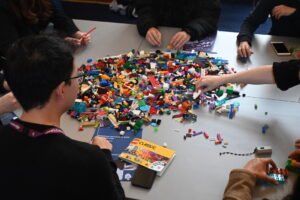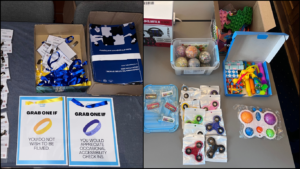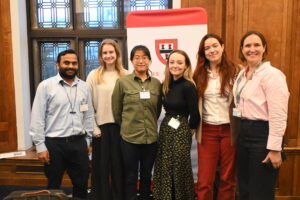In a world where neurodiverse individuals continue to encounter significant barriers in the workplace, targeted solutions remain scarce and fragmented. The ThinkLab Hackathon, a pioneering initiative held at Jesus College, University of Cambridge, on December 11-12, 2023, sought to change this narrative. Co-hosted by the University of Cambridge ThinkLab, Google Accessibility Discovery Centre, and BBC CAPE, this event marked a concerted effort to enhance representation and foster accessible, equitable work environments.
The Challenge of Underrepresentation
Despite an increasing awareness of neurodiversity, a significant gap remains in the representation of neurodiverse talent within the workforce. Traditional workplace environments often fall short in addressing the specific needs of neurodiverse employees, highlighting the vital necessity for innovative and inclusive solutions.
The Hackathon emerged as an effective response to this challenge, and created a collaborative space where diverse minds – from researchers and technologists to inclusivity experts and neurodiverse individuals – could converge. Their shared mission was to rethink and remodel workspace design to better align with the requirements of a neurodiverse workforce.
Innovation Through Collaboration
Participants at the LEGO Serious Play Ideation Session, facilitated by Dr Monique Boddington.
Spanning two days, the event was packed with keynote speeches, breakout sessions, and collaborative team activities, all inspired by an ‘accessibility-first’ approach.* This included quiet rooms, sensory aids, and clear navigational tools to cater to the varying needs of our participants. The diverse range of speakers, specialising in technology, inclusivity, neurodiversity, and workplace design, underscored the critical importance of such inclusive initiatives.
Access bracelets and fidget toys.
For the brainstorming and collaborative work sessions, participants were divided into three interdisciplinary teams. Each team democratically assigned roles and engaged in idea development, receiving guidance and mentorship from professionals across various sectors—including technology, media, finance, and academia—who have experience in working with diverse teams and creating inclusive workplaces.
Amidst the flurry of creativity and collaboration, the teams came up with three distinguished ideas and pitched their concepts to our jury. The project Highlite captured third place with its open-source vision to experience sharing among neurodivergent employees, Neurodiversity Hero Game earned second place for its inventive approach to onboarding practices and Embodied emerged as the clear winner with its creative and comprehensive approach to digital remote work platforms.
The Journey Ahead
Team photo of the Embodied team.
Recognition for these innovative efforts has already begun, with accolades being awarded to the teams for their creative contributions and the promising potential of their ideas. The team Embodied stood out, securing first place and a £5,000 cash prize, while the teams in second and third places received £2,000 and £1,000 respectively.
Building on the foundation of their initial concepts, each team is now poised to transition their ideas into tangible prototypes. With the support of ThinkLab and Cambridge Enterprise, this next phase will be characterised by a deeper exploration and realisation of their visions. Utilising the resources allocated for this purpose – which include funding for research reports, software specifications, and the creation of design models – the teams will have the opportunity to refine and develop their projects further.
Next steps
The ThinkLab Hackathon was more than just an event; it is, as we deeply believe, a symbol of our commitment to inclusive, neurodiverse-friendly workplaces. Looking ahead, the focus shifts towards guidance and development in collaboration with Cambridge Enterprise. We aim to explore potential applications and share our findings, while also supporting the teams in transforming their ideas into impactful products and services. Through these efforts, we hope to influence policy, crafting concise and insightful papers that provide actionable recommendations for embracing neurodiversity in organisations.
Thank you!
Finally, we cannot conclude this post without expressing our heartfelt gratitude to our judges and mentors, who travelled to Cambridge from various corners of the world and generously shared their professional insights with our participants. Special thanks go to the competing teams, as well as our own ThinkLab team and members of the Jesus College Intellectual Forum, who dedicated two entire days to this event despite a myriad of responsibilities. Their incredible creativity and team spirit made this event a transformative experience for everyone.
*As part of this approach, we created and shared the following documents with our participants ahead of the event, aiming to provide a clear understanding of what to expect on the day and our strategies for accommodating diverse access needs:






